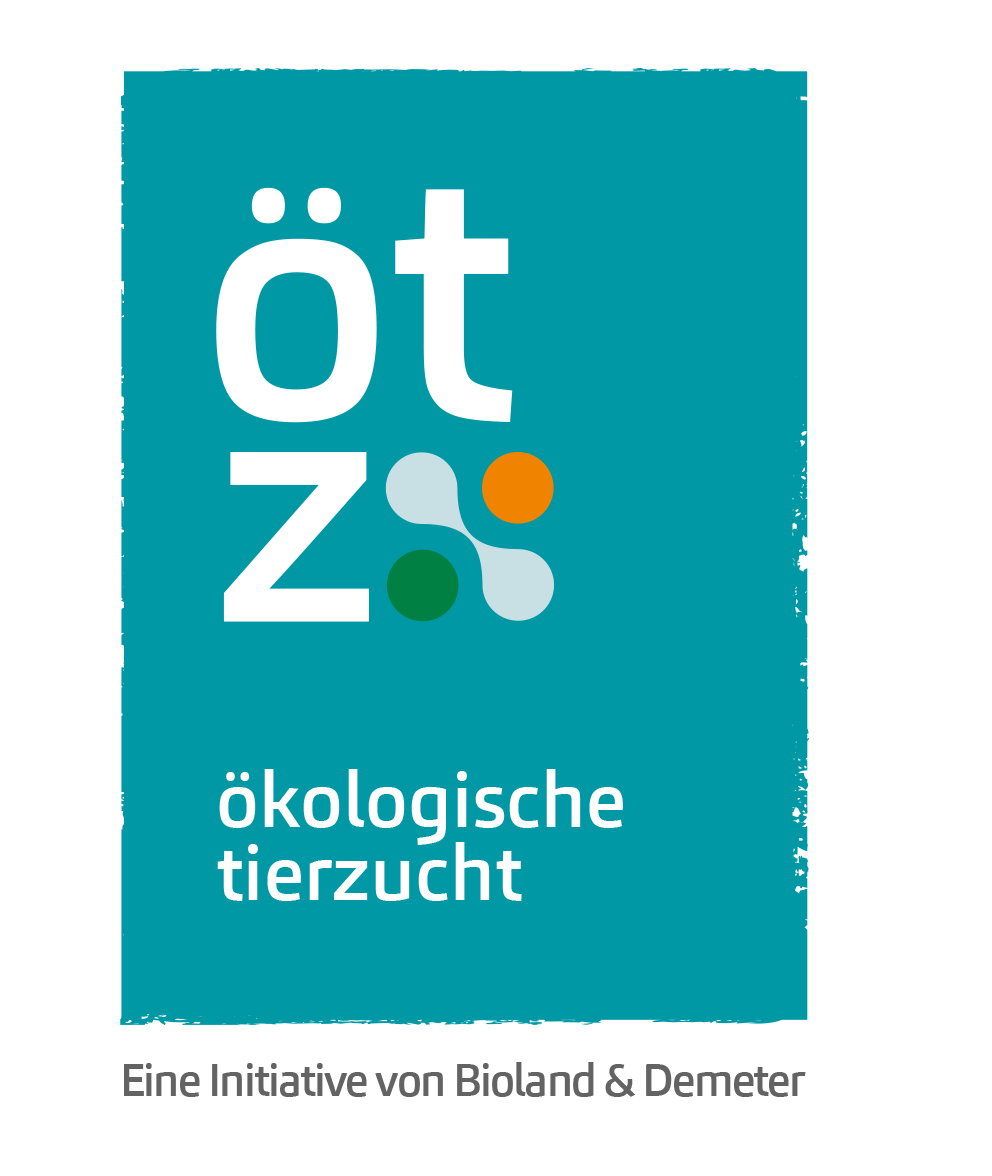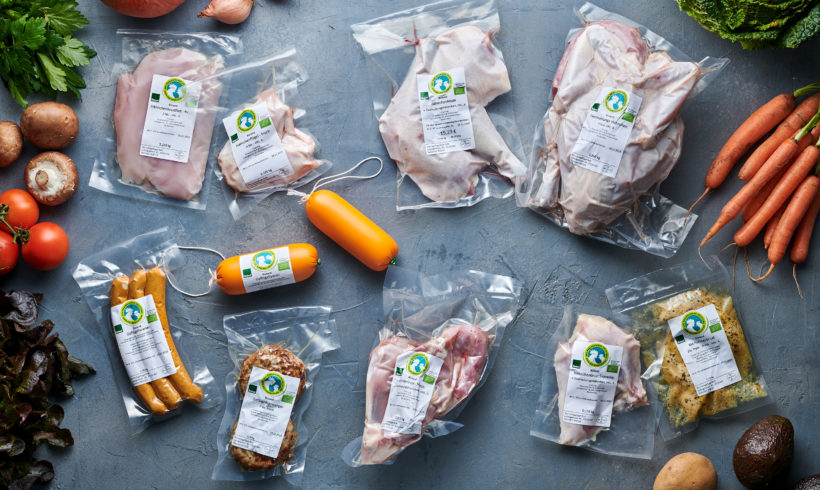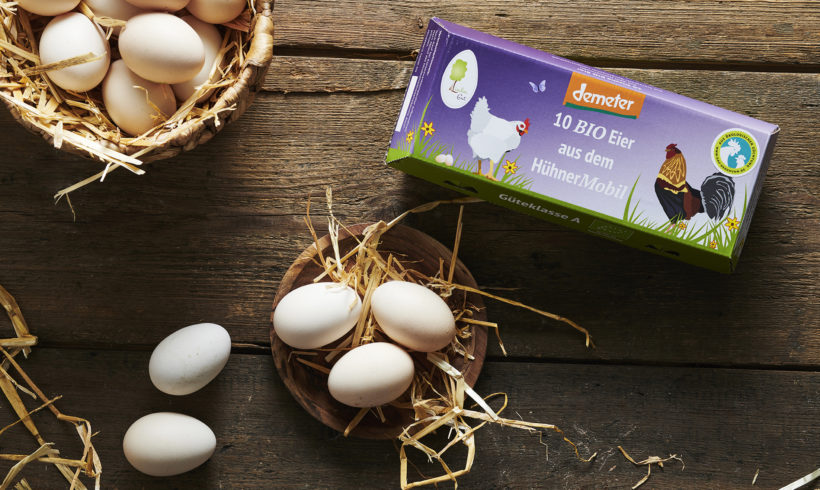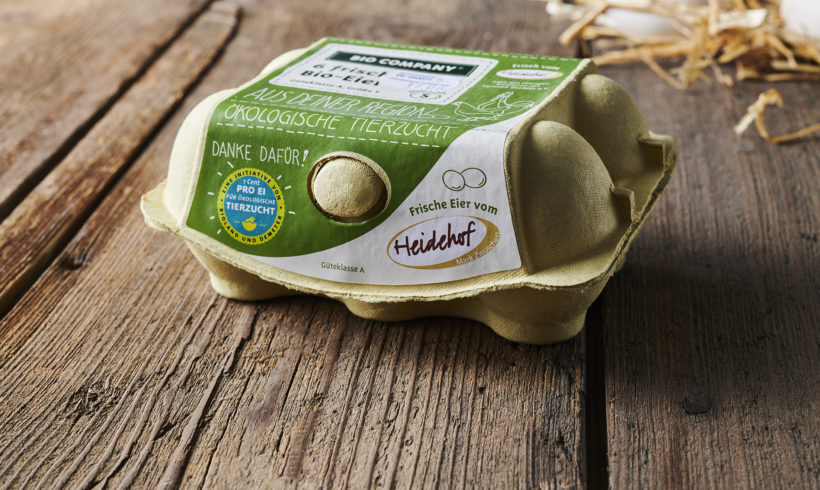Heading
CREATING THE FUTURE – BREEDING THE ORGANIC CHICKEN WITH FUTURE
WHAT IS THE ORGANIC ANIMAL BREEDING association (ÖTZ)?
In early 2015 the Organic Associations Bioland and Demeter founded the non-profit organization Ökologische Tierzucht gGmbH (ÖTZ) with the longterm goal of breeding animals specifically specially adapted to organic farms. Currently, ÖTZ’s main-focus is the breeding of laying hens and dual-purpose chickens. A future goal of the organization is to breed other animal species as well.
THE BENEFITS OF ORGANICALLY BRED,
DUAL-PURPOSE POULTRY
- Larger stomachs, adapted to 100% organic feed
- Robust and healthy due to balanced performance
Our mission statement.
Breeding animals the organic way means:
- Organic feed free of chemical and synthetic artificial amino acids is the integral fodder foundation for all breeding animals.
- All breeding animals must be kept in groups and in accordance with the standards for organic chicken husbandry. The use of single cages housing, which is currently the norm in commercial, non-organic poultry breeding programmes is not permitted.
- Artificial insemination is to be completely avoided whenever possible.
- As a matter of principle the male chicks are raised.
- In-egg sex determination and genome editing techniques are not permitted.
- Preventative antibiotics are not used. There is also no use of synthetic means to increase fertility or performance.
- No manipulation of any kind to beaks, combs or wings is allowed.
- The increase of performance leading to physical stress or the reduction of natural body proportions and functions (such as; breast, joints, walk and flight ability) is forbidden.
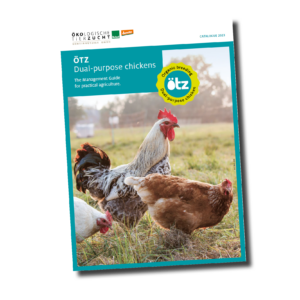
Details about the dual-purpose chickens from organic breeding are summarized in a management guide for practical farming.
What is the meaning of dual-purpose breeding?
For us, dual-purpose means that cockerels and hens are economically independent birds. The cockerel produces meat; the hen produces eggs. This means that the cockerel is not subsidised by the hen, unlike the German “Bruderhahn” (brother cockerel) concept. Both can be fed according to their needs with 100% organic, locally produced feeds. With the right marketing, the hen’s lower egg yield can be balanced out by its heavier carcass at the end of its life. It is a dual-purpose concept, which makes sense organically based on the use of alternative, conservative feeding. The question then centre around what the bird has eaten, rather than how much.
ÖTZ documentation part 1 – Motivation and insights of dual-purpose chickens breeding work
-
independent breeding of animals,
-
orientation towards ecological husbandry and feeding conditions from the beginning
-
moderate performance in order to exclude high-performance-related diseases
-
hen, rooster and egg are linked very close – for the same value of eggs and meat
ÖTZ documentation part 2 – Holistic marketing of dual-purpose chickens.
ÖTZ Dual-purpose chickens are roosters and hens that behave like birds. They offer an alternative to classic fast fattening and high performance egg production. Dual-purpose chickens need some more time to grow. The result is an significant better product, from highest quality and best taste. It offers versatile potential for refinement and maximum added value.
This documentation part shows possible ways for an holistic marketing of dual-purpose chickens, beginning with the slaughtering and ending with various possibilities to process all relevant parts of the animals in a value adding way. It presents also concrete refinement and product examples.
MARKETING ÖTZ PRODUCTS
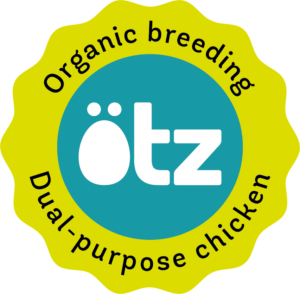
Trademark
Trademark: The “Organically Bred” seal labels egg and meat products that are directly derived from organically bred poultry. Our homepage www.das-oekohuhn.de illustrates to consumers how the special quality of the products differs compared to those from not-organic bred poultry. Usage of the seal is restricted exclusively to partners with a valid ÖTZ brand trademark contract.
Do you keep organically bred poultry and want to label your products as well? Then please get in touch with us via info@oekotierzucht.de.
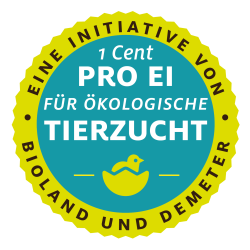
Our campaign:
Donate 1-cent for organic breeding
The 1-Cent-Seal is meant as a demonstration of commitment to our common goal without (yet!) using the products directly. The idea is that traders, wholesalers, direct marketers and retailers selling organic eggs from non-organic breeding origin donate one Eurocent per egg to our cause. In return you can use the above displayed seal and our general marketing and campaing material to show the consumer your financial involvement. The usage is exclusively restricted to subscribers of our campaign.
Would you like to support our work, please get in touch via info@oekotierzucht.de.
WHY THE DUAL-PURPOSE CHICKEN AND NOT THE IN-OVO-TECHNOLOGY PRESENTS A CHANCE TO FURTHER SHARPEN THE PROFILE OF THE ORGANIC SECTOR
In-egg sex determination as an alleged alternative for chick culling is discussed for years now. It is expected that some of the technical approaches will reach market maturity and will be established in the sector. ÖTZ, “Organic Animal Breeding” opposes sex determination as an industry solution for organic agriculture and commits itself to the reasonable rearing of the roosters.
Why?
- The killing of hatchlings is merely brought forward in time and does not alter anything in regards to the welfare of the animal.
- As an integral part of the ecological cycle and as a holistic approach, the rooster should be like the eggs included in the marketing concept.
- The in-egg-technology reinforces the current dependency of organic farming on the conventional breeders non-organic breeding industry.
- The rearing of as well as the meaningful utilization of the rooster can serve the organic industry by offering a further opportunity towards an even more sustainable and credible profile.
- Particularly notable is that the dual-purpose rooster is nourished, resource efficiently and at low cost using regional and residual feed. In this scenario that the feed utilization is no longer the calculation of, ratio of kilo feed to kilo growth but viewed in the greater context of the decreased use of internationally imported feed.
JOIN US IN BREEDING TOMORROW’S ORGANIC CHICKEN
“This is our decisive response to the widespread view promoted by the agricultural industry, that we should produce more to feed the world: No! We produce and eat too much. We feed ruminants cereals and corn instead of hay and grass. Instead of feeding our poultry and pigs leftovers like bread and whey, we import soya from Brazil, damaging the rainforest and ultimately our own livelihood. We don’t need more; we need less. Less of everything. Less industry, fewer imports, less production” (ÖTZ, October 2019).
This statement by ÖTZ (Ökologische Tierzucht gGmbH) on World Food Day in autumn 2019 explains what motivates us every single day. We are convinced that the current system is not sustainable in the long term and are looking for new approaches that are not based on pure cost-benefit analyses. It is time to leave our comfort zone, to be self-critical and to question our existing structures.
For us, as organic poultry farmers, this applies primarily to the topic of cockerels and hens. Yet the ÖTZ takes this a step further than simply eggs and meat, and the associated “dual-purpose” chicken. It is our firm belief that independent, organic breeding with a clear breeding goal of “organic farming” is the only way to meet the requirements for sustainable poultry farming that is truly centred around the birds’ welfare.
Accordingly, cockerels that are raised on the farm now and in future should not be a cause for concern; they should instead be viewed as an opportunity for new and diverse ways to co-operate between fatteners, processors, breeders, laying hen farmers and feed mills.
We are campaigning for the male dual-purpose bird to be regarded as something other than a problem for egg producers or as a competitive product to organic fattened cockerels. They should be seen as so much more than well-adapted genes that are particularly suited to organic farming, offering an excellent basis for breeding high-quality poultry for meat production.
In view of resource protection and climate change, feed choices will become particularly decisive for successful dual-purpose poultry farming. Awareness of a need for further research exists here.
Now is the time to seize the opportunity to rear cockerels! We actively support you in marketing your male poultry through our meat co-ordination office and our trade-specific ÖTZ/BID training opportunities. Demonstrate the exceptional quality of your work by using the ÖTZ “Organically Bred” product seal.
This new edition of our annual publication contains all the latest performance data for our dual-purpose Coffee, Cream and Bresse Gauloise breeds.
If you have questions about the poultry, please feel free to contact us any time. Should you decide to take the first step on this new path today, you can count on our full support.
Warm regards, Inga Günther
